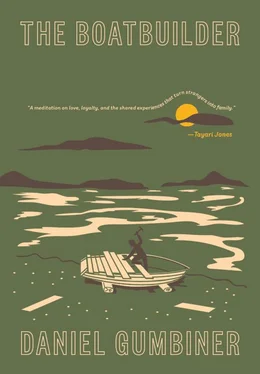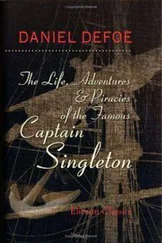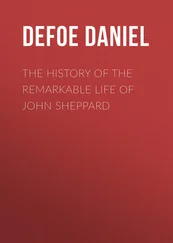Alejandro went on in this manner, discussing the different contingencies of his kelp situation. His mind seemed scattered, burnt out, overheated like a computer that was running too many programs. When he finished, Berg asked him if he knew where the jig was.
“I don’t know where I put it,” Alejandro said.
“But you were the last one to use it.”
“Look, I just said I don’t know,” he snapped. “Make a new one. It’s not difficult to make one.”
“I don’t know how to make one,” Berg said.
“Just think about it for one second,” Alejandro said. “It’s not hard. I don’t have time to explain it.”
Berg walked back up to the shop, hurt and irritated. He thought about their conversations in the forest. Alejandro was such a hypocrite. He preached equanimity and awareness and then he behaved like this, with a total lack of respect. It wasn’t Berg’s fault that Alejandro had lost the jig. Here he was, listening to Alejandro talk about his kelp problems for twenty minutes and then the guy wouldn’t give him one moment of assistance.
Back in the shop, Berg began designing a new jig. It turned out, to his dismay, that Alejandro was right. It was an easy tool to construct and he finished making it in less than an hour. He used the jig to rivet the plank he’d finished and then he took his lunch beneath the buckeye tree.
As he was eating, Alejandro walked past him.
“Hey, did you get that jig figured out?”
“Yes,” Berg said.
“Oh, good,” Alejandro said. “Well done. Do you need anything from the house?”
“No.”
“I’ll be up there for a little bit. Feel free to come find me if you need anything.”
Berg could tell he was trying to apologize. He’d probably figured out the kelp issue and, liberated from his frustration, become aware of how brusquely he’d spoken to Berg. That didn’t make it okay, Berg thought.
After lunch, Berg began to work on his next plank. At a certain point he paused and looked around the shop. His gaze settled on the photo of Alejandro and Uffa from many years ago, the one where both of them were wearing overalls. He was struck, again, by how young Uffa looked in the photo. His hair was long and fine, like some kind of Arthurian knight’s. As Berg looked at the photo, he imagined Uffa showing up at Alejandro’s doorstep, a lost teenage wastrel who had read some book and thought he knew who Alejandro was. He imagined Alejandro taking Uffa in, those first few days he spent teaching him how to sharpen chisels and how to sail. As he thought about this, something in his heart softened. He realized that he was giving Alejandro no leeway, no room for error. He had made him into an idol, long ago, and if he seemed for a moment imperfect, Berg felt betrayed.
He took the jig from the workbench, pocketed it, and walked over to the farmhouse. Alejandro was in the kitchen, drinking coffee and rolling a cigarette. Berg took the jig out of his pocket and showed it to him.
“This is the new one,” he said brightly. Alejandro took the jig in his hands. Berg poured himself a cup of coffee and sat down next to him.
“Excellent job, Berg,” he said, holding the jig up to the light. “This is excellent.”
SOMETIMES, FOR LUNCH, UFFA wanted to eat a cheeseburger. He was particularly fond of the cheeseburger at the Station House, the diner on Main and Third that was run by Patty McClure. Patty had bought the restaurant thirty years ago, after divorcing her husband in Los Angeles and moving up to Talinas. The menu at the Station House was simple and cheap and there was absolutely no ordering breakfast after 10:30 a.m. because, by then, Patty had heated the grill to lunch temperatures and there was only one grill.
Uffa always ordered a cheeseburger, fries, and a milkshake, which was served in a beveled glass with whipped cream and a maraschino cherry. Uffa loved maraschino cherries and would ask for extras. Berg normally got a BLT and a cup of soup. They would eat their meals and read the local paper and maybe, if things were slow at the shop, they’d order coffees after lunch and talk to whoever was around. The Station House was usually bustling, full of farmers and high school students and retirees, all them sipping their coffee, the air humming with newsy talk.
After one of these lunches, Uffa and Berg returned to the shop to find Alejandro sitting at the round table, reading a book about bivalves.
“Town?” he said when they walked in.
They nodded.
Berg made his way over to the workbench and began planing a long piece of straight-grain fir. He was shaping a pair of oars for the dory on Celia’s boat. After a few minutes of planing, he realized the blade needed sharpening, and he walked to the back of the shop, to the water stones. Right after he dipped the blade in the plastic tub of water, he heard someone calling Alejandro’s name from the barn door. He turned around to see Pat the Pilot.
“Pat!” Alejandro said, looking up from his book. “What… what the hell?”
“Hey there, Ale,” Pat said. He was wearing a baseball hat and jeans and there was some kind of scab on his forearm. Alejandro stood up and embraced Pat. Berg and Uffa walked over, shook hands with Pat.
“What are you doing here?” Alejandro asked him.
“Just came over to say hi.”
“What do you mean?” Alejandro asked.
“We escaped,” Pat said.
“You what?”
“We escaped,” he repeated. “They sprung us.”
“Well,” Alejandro said, stuttering, “then… then you shouldn’t be here. You should be in hiding somewhere, shouldn’t you? I mean, aren’t they looking for you?”
“Who?”
“The police.”
“Oh yeah, but they’re dumb as prairie dogs,” he said. “I’m not worried about them.”
“What about the other guys?” Uffa asked.
“They’re sprung, too,” Pat said.
“How did you guys get out?” Berg asked.
“That’s a long story,” Pat said. “That’s a story for another time. I just wanted to come by and say hi to y’all, see my people, you know. I was over in Sacramento yesterday, visiting Lammy. I’m going to be taking off for a while.”
“What are your plans?” Alejandro asked.
“I’m going out to Reno for now,” he said. “Not sure where I’ll be after that. Thinking of heading to Colorado.”
“I know a good man out there,” Alejandro said. “A rancher and old anthropology friend. Willard Rudin. I’ll give you his information. Lives in Trinidad.”
“Thanks, that’d be good. I’m hoping to get way out in the backcountry.”
“I understand,” Alejandro said. He paused for a moment, seeming unsure what else to say. “Well, I’m happy for you, Pat,” he continued. “It’s a new start, in a way.”
“It is. It’s a new start for you, too. Lammy said something about a scallop garden.”
“3-D sea farm.”
“That’s right.”
Alejandro took out his farming sketches and showed them to Pat. “I’d take you out to see them,” he said. “But there’s not really anything to see, unless you go underwater. They just look like buoys out there.”
After Pat looked at the drawings, he said it was probably time for him to be going. Berg could tell Pat seemed a little unnerved. Alejandro had talked a lot, had explained the drawings in perhaps too much detail. Berg could see this beginning to happen now. Could see Alejandro’s mind start to run ahead of itself, to lose perspective. Berg wondered if this was the type of thing that worsened with age. Still, Pat did not seem surprised.
“You take care of yourself, Ale,” he said, turning to go. “You hear me?”
“I will,” Alejandro said.
Then Pat walked out the door and went into hiding. Berg never saw him again.
Читать дальше












